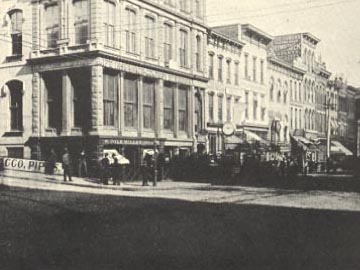
This is part 1 of the story (in 5 parts, plus one digression) of a white man who tried to glue together his life, sliced in two by the Civil War, by uniting in himself the most irretrievable parts of his past: master and slave. It’s a story that cobbles together, too, a paradox of American music — a paradox of music anywhere: the exploitation of folk music by privilege is often the essence of its preservation. It’s the story of Polk Miller.
POLK MILLER: 1 Roots | 2 “Old Plantation Negro” | 3 “Young Negroes” | 4 Rising Controversy | 5 Appropriation & Preservation | Cats & Dogs
Among the many, many oddities of the nineteenth century, one of the oddest was the craze for “Negro delineators,” white men who presented to white audiences impersonations of black slaves. Today, such performances would stretch the limits even of satire. But Polk Miller was one of a legion. What set him apart was his genuine passion for African-American roots music, a passion that jarred even in his own times against his deep conviction in white supremacy.
James Agnew “Polk” Miller began life in 1844 as the youngest son of a planter in Prince Edward County, Virginia. Miller’s nickname did not pay tribute to President Polk, whom the family disliked. Miller’s daughter related that “a Negro mammy” scolded the saucy boy, “‘Hush yo’ mouf’ … Yo’ as bad as ole Poke.’”
The nursemaid formed part of a large labor force of slaves who served the house and cultivated and harvested the fields. She would have been a powerful mother figure to Polk, whose own mother died when he was ten. Her children and those of other enslaved women romped with the Miller children. Among “four brothers and many colored boys” Polk became “a leader in all athletic sports” and “one of the finest field shots in Virginia.” A love of the outdoors grew in the young boy, along with a fascination for the music and folktales of enslaved black people.
Polk didn’t stay on the plantation. With an abundance of male heirs, his father sent his youngest son, at 16 years old, to apprentice with a pharmacist in Richmond. Miller’s new job included work performed by slaves at home. He polished mirrors and scrubbed counters, soaking his shirts so badly he put a newspaper against his skin, “but in an hour the Herald could have been read through the shirt.” He worked with a will, and his cheerful demeanor made him a favorite with customers.
With his brothers serving the Confederacy, Miller’s family held him back from enlisting, but at nineteen he could no longer resist joining up. He’d served barely a year before he “furled the banner of the Lost Cause at Appomattox.” This quote, by his son, gave rise to the idea that Miller literally furled the Confederate flag at Appomattox, but the intention was likely figurative, a reflection of Confederate-era convictions and nostalgia that yet run deep in America.
Miller tried farming, failed, then returned to Richmond and the pharmacy business. Over the next couple of decades, he married, ran his business to great profit, contributed to church and community, and raised a daughter and a son in Bon Air, a suburb of Richmond. He was widely published as an outdoorsman, and his love of hunting and dogs converged with his pharmaceutical skills to birth his most well-known legacy. Earning the gratitude of pets and their humans to this day, Miller founded Sergeant’s Pet Care Products. (For more on cats and dogs coming in the house, in the 19th century: here).
During this period of prosperity and apparent conformity, Miller covertly pursued his passion for black roots music. “I wouldn’t tell anybody that I even ‘knowed how’ to play the banjo because it was looked upon as a ‘nigger instrument’ and beneath the notice of the cultivated. For years, I longed for the time when it would come in fashion, and I could play on my favorite musical instrument without disgracing myself in the eyes of my city friends….” 2 | “Old Plantation Negro”
Sources: Polk Miller’s scrapbooks and memorabilia. Collection of Valentine Richmond History Center. | Withers Miller, “Biography of Polk Miller.” Undated manuscript. Collection of Valentine Richmond History Center. | Jacques Vest, “Polk Miller’s Old South Quartette,” Virginia Magazine of History and Biography, vol 120, no. 2, 147. | | Larry Hall, “Rural roots, pet care and songs of the South,” Richmond Times-Dispatch, March 15, 2006 | Lyon G. Tyler, Men of Mark in Virginia. (Washington, DC, 1907), 263. |
A fascinating and well-sourced portrait of a man who was walking a line for sure. I appreciate that you delve into the attitudes of both white and black people who lived before and during the war vs. those who came of age afterwards.
Thanks! I think it must have been a confusing time for everyone in the South, with the status quo completely upended.
Pingback:Polk Miller and "the young negroes"
Pingback:Cats and Dogs Join Us Inside the House
Pingback:Polk Miller: Appropriation and Preservation